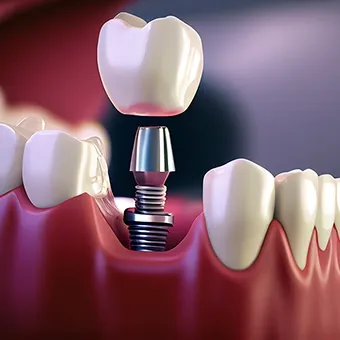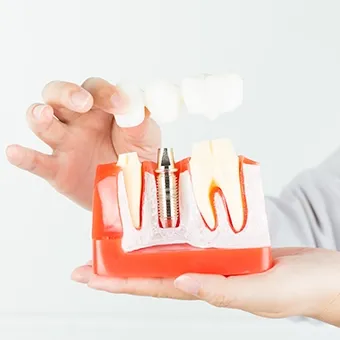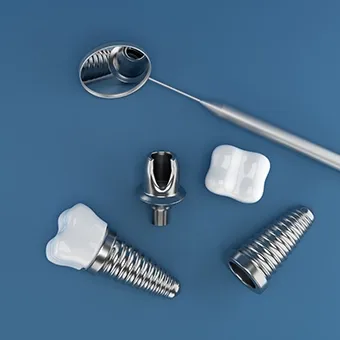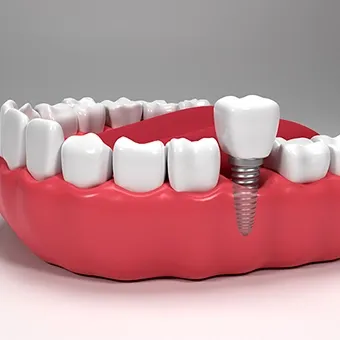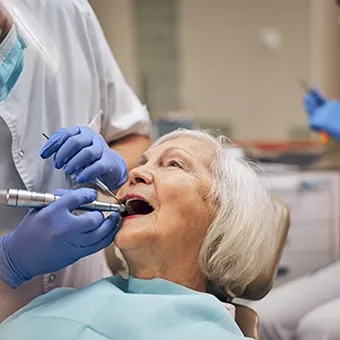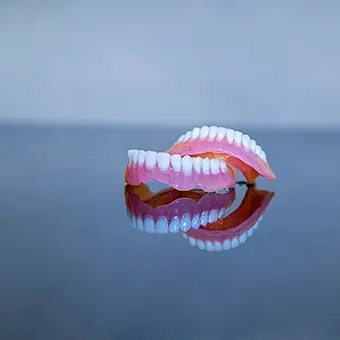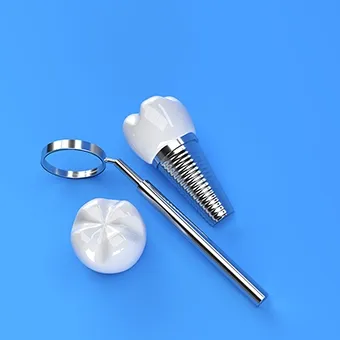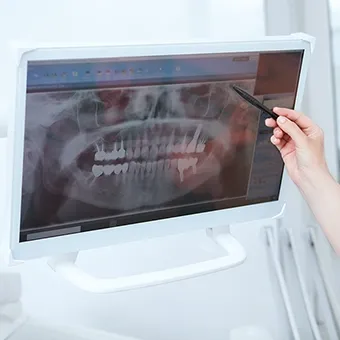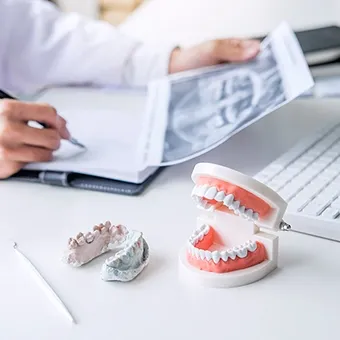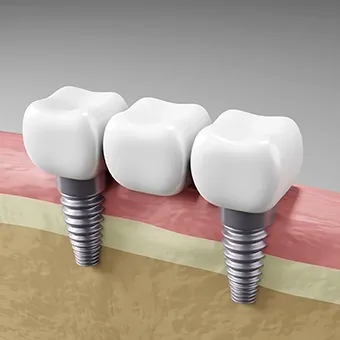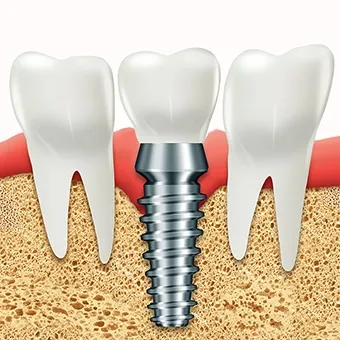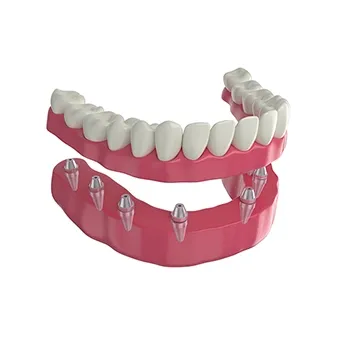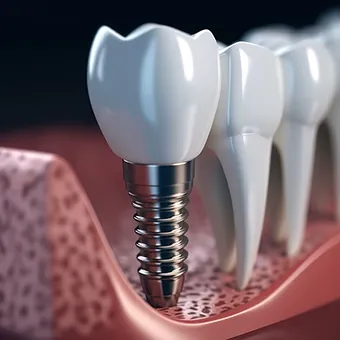Frequently Asked Questions by Patients Before and After Implants

Is dental implant treatment painful?
Implant treatment is usually performed under local anesthesia, so you do not feel pain. There may be minimal discomfort or pressure during the surgical procedure, but this is usually mild. Post-treatment pain is generally mild to moderate and can be managed with painkillers.
How long does dental implant treatment take?
Implant treatment consists of several stages, and the duration of treatment depends on various factors. The implant placement stage usually takes 1 to 2 hours. An osseointegration period is required for the implant to fuse with the bone, typically lasting 3 to 6 months. Afterwards, the prosthesis or crown placement is performed, which can also affect the overall treatment duration.
How long do dental implants last?
The lifespan of implants can last many years if properly placed and well-maintained. Maintaining good oral hygiene and regular dental check-ups can extend the life of your implants. Generally, implants are durable for a lifetime, although prostheses and crowns may wear out over time and need replacement.
Is there an age limit for dental implant treatment?
There is generally no age limit for dental implant treatment. However, factors such as bone structure, overall health, and oral hygiene are evaluated. In younger patients, the bone structure may not be fully developed, so treatment may be delayed in some cases. In older patients, bone density may be reduced, requiring additional procedures like bone grafting.
Do dental implants feel like natural teeth?
Implants are considered the closest solution to natural teeth. Since implants are placed securely and stably, they provide a similar feel to natural teeth in terms of chewing and speaking functions. Aesthetically, they also resemble natural teeth closely.
Am I a suitable candidate for dental implant treatment?
It is important to consult with your dentist to determine if you are a suitable candidate for implant treatment. Generally, having sufficient bone structure and good overall health are important criteria for implant treatment. However, each individual’s situation is different, and your dentist will conduct a detailed evaluation to determine the appropriate treatment plan for you.
How long does dental implant treatment take to complete?
Implant treatment generally consists of several stages, and the duration depends on the treatment plan, the number of implants, and the patient’s healing process. The implant placement stage can usually be completed in a single visit. An osseointegration period is required for the implants to fuse with the bone, and this period can vary between 3 to 6 months. Afterwards, the prosthesis or crown placement is performed, which also affects the overall treatment duration.
What care is required after dental implant treatment?
Maintaining good oral hygiene after implant treatment is important. Brush your teeth regularly, use dental floss or an interdental brush to clean between the teeth, and use an antibacterial mouthwash. Additionally, it is important to attend regular dental check-ups and get professional dental cleanings. Your dentist will provide detailed instructions on implant care.
Do dental implants support chewing function like natural teeth?
Yes, implants support chewing function like natural teeth. Since implants are placed securely and stably, they provide a safe and comfortable feeling when chewing. This allows you to maintain a normal diet and comfortably chew various foods.
Do dental implants affect gum health?
Implants do not negatively affect gum health. In fact, since implants replace natural teeth, they can help maintain the gum line and provide an aesthetic appearance. However, good oral hygiene and regular dental check-ups are necessary to prevent gum disease.
Are there any risks of complications during dental implant treatment?
Implant treatment is generally a successful and safe procedure. However, like any surgical procedure, dental implant treatment carries some risks. The most common complications include infection, implant failure, bone loss around the implant, and soft tissue problems. These complications are rare and can be minimized with good oral hygiene, regular check-ups, and treatment by an experienced dentist.
Can dental implants cause allergies?
Implants are usually made of titanium, a material commonly used in the body. Therefore, implants generally do not cause allergic reactions. However, in rare cases, allergic reactions to titanium can occur. If you think you have an allergy to titanium, it is important to inform your dentist.
Can I exercise after dental implant treatment?
A healing period is usually required after implant treatment, and there may be some restrictions on exercising during this period. Swelling, pain, or sensitivity may occur after the surgical procedure, so it is important to avoid excessive physical activity during the healing process. Your dentist will provide detailed instructions on exercising after implant treatment.
Are dental implants suitable for people with metal sensitivities?
Implants are typically made of titanium or titanium alloys and rarely cause problems in people with metal sensitivities. The use of suitable materials and proper placement of implants minimize the risk of allergic reactions. However, individuals with metal allergies should inform their dentist and inquire about alternative materials.
These questions and answers provide a general idea about dental implant treatment. However, each patient is different, and treatment details can vary based on your needs and condition. It is important to consult with a dentist to get more information about implant treatment and to answer any questions you may have.
ONLINE APPOINTMENT
Please fill out the form completely to request a callback.
Dental Implant Treatment
The information on the site is provided for support purposes.
Address : Halaskargazi Mah, Halaskargazi Cad. No: 38-66 İç Kapı No:115 Şişli / İstanbul / TÜRKİYE
Mobile : +90(537) 726 39 59
E-mail : info@hekimogludisklinigi.com.tr
WhatsApp : +90(532) 482 22 45
OUR TREATMENTS
MENU
OUR WORKING HOURS :
Mon - Sat: 09:00 - 21:00
Sunday: Closed
© Copyright 2024 Hekimoğlu Dental Clinic - All Rights Reserved.
Last Updated : 06.08.2024



